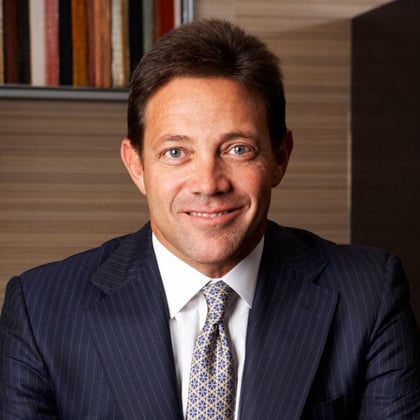A book that merges investor education with expletive-heavy rants against Wall Street, stockbrokers and financial influencers?
Jordan Belfort, the former broker who served 22 months in prison for securities fraud and money laundering, and was ordered to pay $110 million in restitution, has written one: “The Wolf of Investing: My Insider’s Playbook for Making a Fortune on Wall Street.”
Yes, that Wolf. Belfort’s 2007 memoir inspired the 2013 blockbuster film, “The Wolf of Wall Street.”
He is now using his proven power of persuasion to, surprisingly, promote do-it-yourself passive investing.
“You don’t need to take any outside advice,” he argues in a recent interview with ThinkAdvisor. “Just put your money in a low-cost index fund and play the compounding game over time.”
“The Wolf of Investing” is packed with solid information on investing basics, while laced liberally with salty, irreverent humor skewering the Securities and Exchange Commission, brokers and other financial entities who “coax people to act against their best interest,” he says.
In the interview, he salutes John Bogle, the Vanguard founder, for revolutionizing investing with low-cost index funds. At the opposite end of the spectrum, Belfort — who consults to large companies and tours the world giving sales training seminars — attacks big firms for creating what he terms “weapons of financial mass destruction,” which, he says, woefully mislead the average investor.
In the interview with the Miami-based Belfort, who was speaking by phone from Manhattan, he opines on financial planners and cryptocurrency, as well as imagines his fate if the SEC hadn’t indicted him.
Here are excerpts from our conversation:
THINKADVISOR: When did you come to the conclusion that do-it-yourself investing is best for the average investor?
JORDAN BELFORT: It’s a function of advanced technology — it wasn’t available back in the ‘80s and ‘90s. It didn’t start till the early 2000s with the internet and platforms.
Today, the average person can go on a platform and instantly open an account and buy what they want themselves.
You don’t need people directing you anymore.
Writing about “The Wall Street Fee Machine Complex,” as you’ve dubbed it, you say a component of that system is “stockbrokers and other assorted leeches.” Why do you use that term?
The problem with stockbrokers is that very rarely are their interests aligned with their clients’ interest.
Even when they’re recommending a short-term investment, they’re often getting paid more to recommend in-house products than products that would be in the best interest of their clients.
You write about Wall Street in pretty harsh terms. For example, “The Wall Street Fee Machine Complex” is a “giant blood-sucking monster” that you liken to the Mafia. Please explain.
There are basically two sides to Wall Street: the positive side, which is vital to the proper functioning of the world’s economy and which creates massive value in the process.
And the other side?
The dark side. It creates weapons of financial mass destruction to line its own pockets and suck the public dry, as I write in the book.
The [“Complex”] tries to convince the average investor that short-term trading, timing the market and buying products that have higher fees [is what they should do].
It’s part of the advertising-media-Wall Street situation where investors are being coaxed to act against their best interest.
The [“Complex”] is sort of an incestuous relationship: Wall Street, Washington and the media. People hawk stuff in magazines and on TV. Investors are being pushed into doing the opposite of what’s in their best interest.
One of the big perpetrators is CNBC, where it’s like, “Buy this, sell that.” Jim Cramer is a one-man wrecking crew.
“Wall Street tries to pick your pocket on a daily basis,” and people working on the Street are “greedy bastards,” you write. Care to elaborate?
I don’t say that about all people. Many are very honest. It’s the institutions themselves. It’s everything together.
But the SEC “knows exactly what’s going on at the big firms with bubbles, stock manipulations, fraud and malfeasance,” you write. Yet it does nothing to stop it, you say, “except for some laughable small fines.” So, you don’t think the SEC is doing a good job?
Actually not. I’m not the first person to say that; it’s obvious. Look at what they did with the global financial crisis [of 2008-2009]. That was insane.
And what happened to people at the big firms that perpetrated it? Some went to jail. [Others] paid [ridiculously] small fines compared to what they did. The [banks] got huge bailouts.
There’s an anger out there about the financial system — and rightfully so.
“When it comes to the financial world, the devil is in the details,” you write. Is that your warning?
I think it’s true, especially when dealing with financial products that are being recommended to you.
It’s very easy for you to [construct] a very effective portfolio for the long term. I don’t think you need to take any outside advice.












 Copyright © 2024 ALM Global, LLC. All Rights Reserved.
Copyright © 2024 ALM Global, LLC. All Rights Reserved.